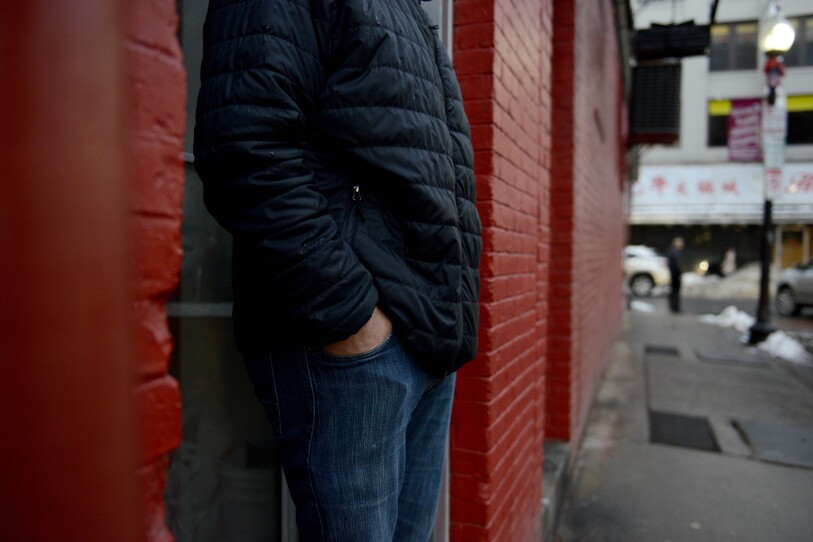This article is part three of a five-part series titled "The Business of Illicit Massage." Parts one, two, four and five are also available online.
FRAMINGHAM, MA — Police Detective Sergeant Timothy O’Toole points to the second floor windows of a brown box-shaped building in the middle of a busy residential mall. The glass is tinted, the lights are off and a painted sign has been stripped away — nothing to indicate that until recently this site was a so-called massage parlor selling “happy endings” to male clients.
“You have restaurants, coffee shops, and now you have male parties coming and going for one purpose,” O’Toole said recently. “Who would think that they would open up a place where sexual activity is occurring for a fee at a location such as this?”

Before the Greentree Health Spa was shut down last year, sex buyers crowed about the place on an erotic online review site called Rubmaps, a digital forum that lists some 7,000 illicit massage-related businesses across the United States.
Most described in graphic terms the kind of sex they could buy at the Framingham spa. One reviewer wrote, “Jennifer embodied everything that I wanted, yet couldn't get out my wife.” Some called her a sweetheart, others mentioned routine details like the easy parking. One man described how he dropped his wife and kids off at a nearby park before heading in “to get some relief.”
There are now seven active sites in Framingham, nearly 200 across the state, according to data provided by the anti-trafficking group Praesidium Partners.
Indeed, on any on any given day there are about 9,000 online searches in the Boston area on Rubmaps and other internet sites for places to buy sex, according to Demand Abolition, an anti-human trafficking organization based in Cambridge. Buyers represent every race, every color and every profession. Company executives, lawyers, police officers, teachers and politicians have been arrested in stings over recent years. A new study by the D.C.-basedPolaris Project finds that the largest percentage of buyers are white men with post-graduate degrees making more than $100,000 a year.

One of them is a Boston-area resident who asked for anonymity to tell his story. We're calling him Tom.
“There were a few times I did it at work, at lunch. I was definitely distracted,” he said.
Tom says what at first was a distraction became an increasingly expensive obsession. Money he spent for erotic massage, he says, could have gone to his children’s music lessons, a family vacation or a charity of his choice. Tom is a former buyer who until a few years ago contributed to what has become a nearly $3 billion annual industry in the U.S., according to a recent study by Texas Christian University.
“I spent anywhere from $100, which was probably the typical, to sometimes $200,’’ Tom said. “I spent about $20,000 over those four years.”
Watertown psychologist Joel Ziff, a sex addiction therapist who has worked with hundreds of men, says illicit massage parlors are a gateway into other forms of commercial sex because they appear safer and are less pricey than other forms of prostitution. About 11 percent of sex buyers said their recent paid sex transactions were at a massage parlors, according to a recent Demand Abolition study.
“The appeal of it is it’s convenient. Often times people are driving by somewhere and then go in and it's tends to be less expensive than other forms of commercial sex,’’ he said. “It has kind of a veneer of legitimacy.”

While some men like Tom say they are sex addicts now in recovery, others who shared their stories with WGBH and NECIR reporters say they have no regrets or apologies.
Take a man we call Jeff, an advocate of legalizing erotic massage, who believes the industry is mainly a victimless activity.
The Boston-area professional said he is divorced with little opportunity for intimacy. Instead, he spends his money at erotic massage parlors near his four-bedroom home in a wealthy suburb west of Boston. He argues that not everybody gets the job of their choice.
“I wouldn't want my daughter cleaning toilets. But, unfortunately, in society not everyone can be a vice president of a company or a lawyer or a doctor,” he said. “Some people may choose this is how they can make money and may want to make money.”
Indeed, Jeff compared a sex buyer’s visit to an illicit massage parlor to the same type of guilty pleasure a woman feels when getting her nails done. “I've never had intercourse,’’ he said. “It's just a massage, a massage of your personal parts, and that's all.”
But a growing number of anti-trafficking specialists and law enforcement officials say women are being coerced into the business, manipulated by financial debts, fear and shame to stay quiet.
In many cases, traffickers will take their passports and money, according to Polaris. Federal prosecutors in Minnesota last year filed charges against a ring of alleged traffickers claiming Thai women were forced to work to pay off huge debts, with both the debt and the victims traded like stocks among operators. They described the women as “modern day sex slaves.”
And increasingly, law enforcement and anti-trafficking specialists say focusing on shutting down demand is key to disrupting the industry. Massachusetts Attorney General Maura Healey said her office last year arrested 29 buyers as part of the effort. “If we can break the back of demand, if there are no buyers, there is no business," she said. Some of those cases are ongoing.

But the reality is that only about six percent of buyers are arrested for their part in fueling the commercial sex industry, according to Demand Abolition. So, if men — for good reason — aren’t deterred by the fear of arrest, some who track the industry say they should at least be concerned about their physical health.
Jeff, who visits erotic spas in the Newton-Watertown area, isn't worried. “So far, I've found the place very, very clean," he said. "They change the sheets every single time. They wash their hands.”
Framingham's Detective O’Toole said sex buyers would think differently if they could see what he’s seen when he’s gone into illicit massage parlors with state police forensic technicians and ultraviolent lights. Court records from a recent bust of an alleged business in Hadley found “semen and sperm” on the walls, towels, blankets, doors and massage tables.
“I was personally shocked at the evidence that was found in these locations,” O’Toole said. “You never know what you're going to contract when you're going into these locations and bringing them home.”
Others buyers said they were more worried about getting caught – less by police than by their wives.
Phillip Martin is a senior reporter with WGBH News. Jenifer McKim is a reporter for the New England Center for Investigative Reporting, a nonprofit news partner of WGBH News.






